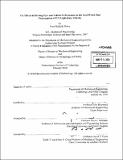The effects of driving style and vehicle performance on the real-world fuel consumption of U.S. light-duty vehicles
Author(s)
Berry, Irene Michelle
DownloadFull printable version (21.87Mb)
Other Contributors
Massachusetts Institute of Technology. Technology and Policy Program.
Advisor
John Heywood.
Terms of use
Metadata
Show full item recordAbstract
Even with advances in vehicle technology, both conservation and methods for reducing the fuel consumption of existing vehicles are needed to decrease the petroleum consumption and greenhouse gas emissions of the U.S. light-duty vehicle fleet. One way to do this is through changes in driving style, specifically through reductions in driving aggressiveness. The role of vehicle performance is particularly interesting because of the recognized tradeoff between vehicle performance and certified fuel consumption and because more powerful vehicles are capable of more aggressive driving. This thesis analyzes the effects of driving style and vehicle performance on the real-world fuel consumption of conventional vehicles though two parts. First, vehicle simulations assess the sensitivity of fuel consumption to a wide range of driving patterns. From these results, three aggressiveness factors were developed for quantifying driving aggressiveness. Each aggressiveness factor, although based only on the speed trace and vehicle characteristics, is proportional to fuel consumption in one of three specific speed ranges: neighborhood, city, or highway speeds. These aggressiveness factors provide a tool for comparing drive cycles and evaluating the real-world driving patterns. Second, driving data from two U.S. sources was used to 1) provide illustrative examples of real world driving and 2) assess the relationship between driving aggressiveness and vehicle performance. The distribution of aggressiveness among the driving data follows a lognormal shape. The average aggressiveness is either below or near the aggressiveness of the U.S. drive cycles developed in the 1990s. Moderate performance vehicles, the most common type of vehicle, are driven most aggressively. Low performance vehicles are driven least aggressively. The results suggest that, for the illustrative data analyzed in this work, reducing velocities during highway driving would save roughly the same amount of fuel as reducing accelerations during all driving. However, on an individual basis, the fuel savings achieved from these behaviors would vary significantly. Aggressive drivers should focus on reducing accelerations, while less aggressive drivers should focus on driving at lower speeds on the highway. And the greatest fuel savings can be attained if the most aggressive drivers, those who drive moderate performance vehicles, drove with lower accelerations.
Description
Thesis (S.M.)--Massachusetts Institute of Technology, Dept. of Mechanical Engineering; and, (S.M. in Technology and Policy)--Massachusetts Institute of Technology, Engineering Systems Division, Technology and Policy Program, 2010. Cataloged from PDF version of thesis. Includes bibliographical references (p. 121-128).
Date issued
2010Department
Massachusetts Institute of Technology. Department of Mechanical Engineering; Massachusetts Institute of Technology. Engineering Systems Division; Technology and Policy ProgramPublisher
Massachusetts Institute of Technology
Keywords
Mechanical Engineering., Technology and Policy Program.